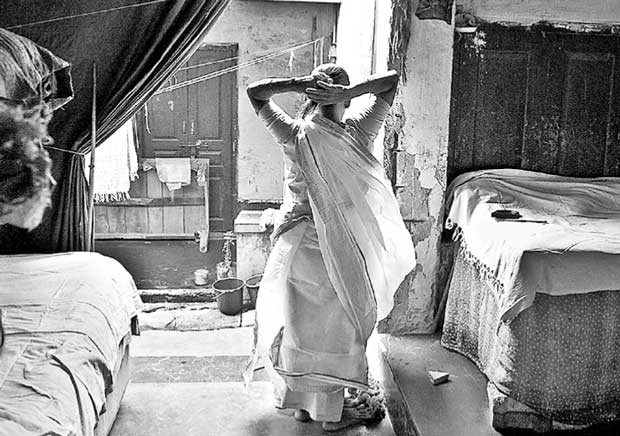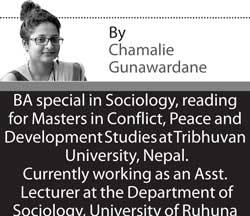Reply To:
Name - Reply Comment
Last Updated : 2024-04-20 00:00:00

 In women studies, the major space is given to analyze gender roles assigned to men and women and how women become the second category prior to men’s dominance. In order to identify the gender and gender roles, difference between sex and gender should be clarified, and though many use the terms gender and sex, interchangeably, those two terms have distinct meanings. The term sex refers to the biological understanding of men and women based on their difference in the reproductive system. For instance only females carry a womb and biologically they have the ability of breast feeding. But gender is considerably a more complex concept than sex. Thus, gender on the other hand refers to the social and cultural role given to these biological males and females, assigning roles that a woman should carry out and a man should carry out in order to maintain the social arrangement. In this manner, we are born male or female and learn to be masculine and feminine.
In women studies, the major space is given to analyze gender roles assigned to men and women and how women become the second category prior to men’s dominance. In order to identify the gender and gender roles, difference between sex and gender should be clarified, and though many use the terms gender and sex, interchangeably, those two terms have distinct meanings. The term sex refers to the biological understanding of men and women based on their difference in the reproductive system. For instance only females carry a womb and biologically they have the ability of breast feeding. But gender is considerably a more complex concept than sex. Thus, gender on the other hand refers to the social and cultural role given to these biological males and females, assigning roles that a woman should carry out and a man should carry out in order to maintain the social arrangement. In this manner, we are born male or female and learn to be masculine and feminine.
Thus, the terms masculine and feminine are attached with gender definitions rather than with the term sex. Think of features on masculinity and femininity as it comes to your mind. To be masculine, the male has to be strong, ambitious, successful, rational, and emotionally controlled. That real men do not cry in public, notes how males become masculine, based on the socio-cultural definition of biological characteristics of a male.Then what do we expect from real women? Real women maintain good looks, adore children and care about homemaking, and this is the role assigned to a biological female by the society. Anyhow, gender is neither innate nor necessarily stable.
According to Simone de Beauvoir; a political activist, feminist and social theorist, one is not born a woman, but rather becomes one. In this manner, feminist theorists claim that gender is the cultural interpretation of sex or that gender is culturally constructed. Thus, gender is used to be seen as the psychological, social, and cultural aspects of maleness and femaleness. In other words, it represented the characteristics taken on by males and females as they encountered social life and culture, through socialization, which starts from the birth of a child and continues till maybe, death. Simply, gender is learned.
The agents of socialization such as family, school, peers, working place, religion, and media shape the construction of gender and gender roles assigned to men and women.
Noting the gender roles more preciously, it is the duty of males and females given and decided by the society. For instance, biologically females possess a womb in which a foetus is developed approximately for 9 months and appears as a baby. This process belongs to nature. But after the delivery of the baby all work is assigned to the mother. Breast-feeding is anyhow a biological task of the mother and all the other tasks of the baby such as bathing, changing nappies, cuddling can be done by the father. But society assigns the role of nurturing to the mother figure, though males are capable of doing it. But, when you say breadwinner of a household, the male figure comes to our mind and it is because of the social picture we have had for many years. The language is also gendered. Accordingly, there is a difference between sex and gender while there are roles assigned to males and females by the society, and males and females are expected to fulfill their assigned duties.
This investigation is presented through research-based findings and widows of the study were the wives of fallen security personnel of the Tri-forces of Sri Lanka. The civil war which prevailed for more than three decades, brought a huge cost to the country. One of the main issues was widows and single parent families of both fallen security personnel attached to the government as well as the civil population in the country. This study was mainly conducted in the southern area of the country, talking to the wives of ex-soldiers who were killed or missing in action due to the conflict of the country.
The loss of a marriage partner creates a sharp break in the surviving spouse’s social and personal identity. In this regard, the impact is greater on women than men even in more normal times. Thus, widowhood is the situation that designates a distinct portion of a person’s life that begins with the death of a spouse. Experiencing being a widow or a widower is different based on the gender relationships with reference to the particular societies. Historically, men and women have been socialized to fill very different roles in society. By understanding the ways in which these roles are defined, we can gain insight into the meaning of losing a spouse for both widows and widowers. Women’s roles, in particular, have been largely shaped by how the role of a wife has been defined over the ages. Moreover, the meaning of a relationship is influenced by the way in which roles are defined, by the expectations partners have of their relationship, and by how they live together, all factors that influence how husbands, wives, and partners will react to a death.
This study investigated the role that women took after the death of the husband; fallen security personnel during the war in the country to continue their family with their children. The study found that the absence of a husband and father, made the majority of these women to take the role of head of the household in decision making and building their life after the demise of the husband, if they stay in their own nuclear family setting. But what researchers could hear from the respondents was that it was not easy for them to do a man’s work such as completing house construction which had been started when the husband was alive. Moreover, some respondents complained about how the community assesses all the efforts they make in continuing their life without the husband. One widow stressed that the most difficult task was to get a mason for house repairing, as these masons did not take much notice of women, thinking that women were less capable of house construction work. Moreover she stressed that when masons got to know that the husband was no more, the problem got worse. What these widows stressed was that usually the community suspects a lonely woman of having extra-marital external affairs with men, as the husband was no more in their life. These widows also said there were several times when their homes were burgled, and it had never happened when their husband were alive.
These widows do not try to engage in work as they receive a sum of money as welfare from the government. They believe in the breadwinner role of their men and consider they should not be employed as they were already unemployed when the husband was alive. Thus, what the researcher could see is that they were reluctant to change the gender roles they were used to.
The single parent situation was another aspect of widowhood in which women had to play the role of both parents. In this case, all interviewed women in the study agreed that they cannot fulfill the role of a father in the life of children, which is very true, but as a mother they somehow provide the caring role which is already assigned to them by the society.
Moreover, some widows were controlled by their native family or by the in-laws, as the society has judgments on such single women, particularly that a young widow should be cared for by somebody else. I remember that one widow found fault regarding her native family and their influence on her and her little child of the age of ten. She revealed her story saying that she had the chance of putting her child into a popular school in the district as her late husband was considered as a war hero, but she could not make it happen due to the restrictions that had been placed by her younger male sibling. Thus, gender construction that women should be controlled by male, was prominent in the stories of these ladies.
In conclusion, what the researcher could analyze was that, even after the demise of a husband, particular gender roles in a family get changed within very limited scope. The patriarchal social structures, the stereotypes of the community, as well as the gender learning of the widow itself had influenced the prevailing gender constructions to be unchanged. Though widowhood had created the absence of the male person of the family, widows are surrounded by the gender teachings and constructions that prevailed for years in our societies.

Add comment
Comments will be edited (grammar, spelling and slang) and authorized at the discretion of Daily Mirror online. The website also has the right not to publish selected comments.
Reply To:
Name - Reply Comment
On March 26, a couple arriving from Thailand was arrested with 88 live animal
According to villagers from Naula-Moragolla out of 105 families 80 can afford
Is the situation in Sri Lanka so grim that locals harbour hope that they coul
A recent post on social media revealed that three purple-faced langurs near t